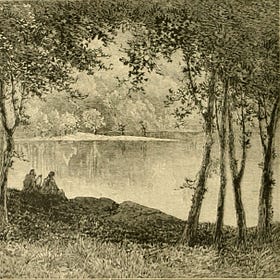In the inn of our emotions, pleasure is a transient guest: leaving as quickly as it arrives, taking nothing with it, and leaving almost no trace behind. Zadie Smith writes, in an essay titled Joy:
…the end of a pleasure brings no great harm to anyone, after all, and can always be replaced with another of more or less equal worth.
A conversation with a dear friend led to a realisation a step further: pleasure is like a drug you build tolerance to very quickly.
It does seem to me that pleasure isn't hard to come by these days, if I'm in the moment and paying attention. We're surrounded by stimuli, and so the pursuit of pleasure can often be painted to be purely hedonistic. But despite being externally-driven, pleasure doesn't necessarily imply a reckless dive into indulgence, an unbridled surrender to excess. A light touch, a comforting hug, the soft brush of the evening breeze against my cheek. A fresh croissant, a roll of blank stickers left on my desk, an out-of-the-blue text: "If I give you this empty bottle, will you do something creative with it?" In the grand scheme of things, these are small instances. But in that moment, they evoke pleasure.
Joy, on the other hand, is a lot harder to pin down. It feels... different. It is less like a product of my current situation, and more an unexpected overwhelming rush of appreciation for my place in the tapestry of existence. It is a build-up, and it builds up to a simultaneous ecstasy and terror that time goes on and moments end. Joy is, as Zadie Smith puts it, "a strange admixture of terror, pain and delight". Rilke tells us that "every angel is terrifying" — I'll tell you that all joy is terrifying.
This wildly ecstatic admixture is earned. Pleasure is easy to get in an overstimulated world; it can exist without having suffered. Joy, on the other hand, often follows hot on the heels of its antithesis, the crest to life's valleys. It isn't something you can pencil into your calendar, like a head massage or an evening at the movies. It'll creep up on you when you least expect it: on the way to Auschwitz, like Zadie Smith; or in line at the supermarket, like seasoned writer and gardener Ross Gay; or on a night bus to my very favourite place in the country, like me.
It might be why I continue to look for it, even if there is a string of pleasures to be had in the moment. I find that no amount of pleasure will suffice if my internal compass does not point to joy. Sure, it feels like joy is in constant communion with terror. But it is unparalleled, and pleasures make for a poor substitute. I would even argue, if hard pressed, that constant pleasure shuts the door on joy, leaving us looking at life through a peephole.
I will borrow from a diary entry written by the wonderful Anaïs Nin:
There are so many joys, but I have only known the ones that come like a miracle, touching everything with light.
And half a century before she writes that, Robert Louis Stevenson says very simply:
For to miss the joy is to miss all.





